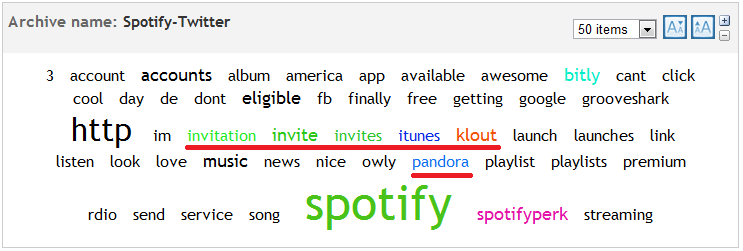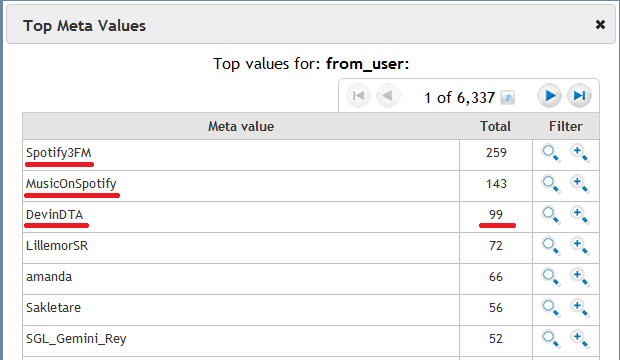In Q1 of this year, serious internet chatter surfaced about the possibility of popular Swedish online streaming music service Spotify launching in the U.S. Spotify is a tantalizing proposition for the American media consumer. While there are costs incurred, the service most resembles the glory days of Napster, when someone could find ANY song, ANY time. Spotify launched in the U.S. Thursday, July 14th, however, they did not open the floodgates for the masses. Much as Google+ did two weeks earlier, Spotify launched via “invites.” First access was granted to those with high Klout scores, and the hope was that there would be a “trickle down” affect.
popular Swedish online streaming music service Spotify launching in the U.S. Spotify is a tantalizing proposition for the American media consumer. While there are costs incurred, the service most resembles the glory days of Napster, when someone could find ANY song, ANY time. Spotify launched in the U.S. Thursday, July 14th, however, they did not open the floodgates for the masses. Much as Google+ did two weeks earlier, Spotify launched via “invites.” First access was granted to those with high Klout scores, and the hope was that there would be a “trickle down” affect.
I secured an invite early in the morning Thursday, and I’ll admit I was quickly hooked. Simultaneously, I began to use DiscoverText to import Twitter feeds to analyze chatter about this captivating new service. I certainly found an invite, but, how well did Spotify execute their plan? Was this attempt at social media marketing successful? In this blog post, I will discuss my goals in trying to gauge how effective Spotify’s launch was, and how other services, such as Pandora, iTunes, and Klout, all closely related to the launch of Spotify, were discussed in terms of Spotify. I will also display how effective DiscoverText is when measuring the successes of social media marketing, and how very simple it is to search, identify, and contact vocal users.
I decided to only pull Twitter feeds for 2 days after the launch. I wanted to see the immediate indicators of Spotify’s success, not the lagging indicators. My Spotify-Twitter archive pulled 113,000 Tweets, which I de-duplicated, leaving me with approximately 100,000. Employing the DT Cloud Explorer, I immediately saw that the words “invitation,” “invites,” and “invite” were used heavily, with 16,000 tweets using these terms.  I then the Advanced Filters to find the most vocal Twitter user. Not to my surprise, official Spotify accounts were the instigators, Tweeting about invites the most, however, Spotify did a phenomenal job getting many diverse users to invite people, with 7,200 users tweeting about invites. So, what person was the most vocal? A user named DevinDTA, from California, tweeted exactly 99 times about Spotify invites.
I then the Advanced Filters to find the most vocal Twitter user. Not to my surprise, official Spotify accounts were the instigators, Tweeting about invites the most, however, Spotify did a phenomenal job getting many diverse users to invite people, with 7,200 users tweeting about invites. So, what person was the most vocal? A user named DevinDTA, from California, tweeted exactly 99 times about Spotify invites.
 It is then possible to see exactly what this user tweeted, and, in doing so, I find the user at first heavily lobbied for an invite, and then, upon receiving one, returned the favor guiding users to invites. This user did exactly as Spotify wished, gaining a customer, and free marketing source. Using the information provided by DiscoverText, it would now be possible to contact DevinDTA, and other high users, or study their behavior specifically to figure out why these users became prolific Spotify promoters.
It is then possible to see exactly what this user tweeted, and, in doing so, I find the user at first heavily lobbied for an invite, and then, upon receiving one, returned the favor guiding users to invites. This user did exactly as Spotify wished, gaining a customer, and free marketing source. Using the information provided by DiscoverText, it would now be possible to contact DevinDTA, and other high users, or study their behavior specifically to figure out why these users became prolific Spotify promoters.
My second goal was to see how disruptive Spotify became to Pandora and iTunes, and how it aided the start-up Klout, which Spotify teamed with to launch its service. Again using the Cloud Explorer, I found “Pandora” and “iTunes” to be the topic of much discussion, with over 2,000 occurrences in the archive. As I parsed this collection, and created several buckets.
 I found the majority of the posts to proclaim Spotify’s coming dominance over Pandora, such as one users statement, “Spotify will be a Pandora killer,” and “Spotify is my new Pandora.” While this represents a very small proportion of the tweets, a large social media backlash is something that Pandora would certainly want to be privy to. Using DiscoverText, it is possible to identify these users, contact them, and discover their motives in degrading the Pandora brand in favor of the Spotify service.
I found the majority of the posts to proclaim Spotify’s coming dominance over Pandora, such as one users statement, “Spotify will be a Pandora killer,” and “Spotify is my new Pandora.” While this represents a very small proportion of the tweets, a large social media backlash is something that Pandora would certainly want to be privy to. Using DiscoverText, it is possible to identify these users, contact them, and discover their motives in degrading the Pandora brand in favor of the Spotify service.
Finally, “Klout” was used 13,000 times in the archive. This experiment proved to be a great success for Klout, who’s website crashed due to the heavy traffic. This was certainly noted in posts by people complaining about their inability to access the Klout website to grab an invite. However, at this point, any publicity is positive for Klout as they try to gain followers and users. Using the Advanced Filers once again, I was able to find the most vocal, and the amount of times “invite” was used with “Klout,” which was nearly every time. You can draw the conclusion the vast majority that “Klout” use was in terms of invites, and not actually the service itself. Completing this exercise it is easy to see that this partnership was smart for Klout, as they no doubt aided Spotify and maybe got a little clout themselves.
It is increasingly likely that brands will continue to use social media to expand their reach. As seen with Spotify and Google+, it is now conceivable to launch a site only to those well connected, and let it proliferate throughout the web. Using this marketing style can be extremely fruitful for a brand, however, using DiscoverText will allow brands to more effectively manage their social media strategy by allow them to interact with their marketing strategies, rendering static social media analysis a thing of the past.

